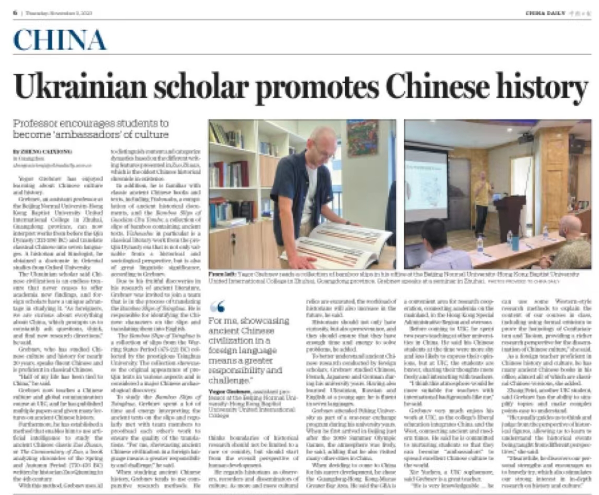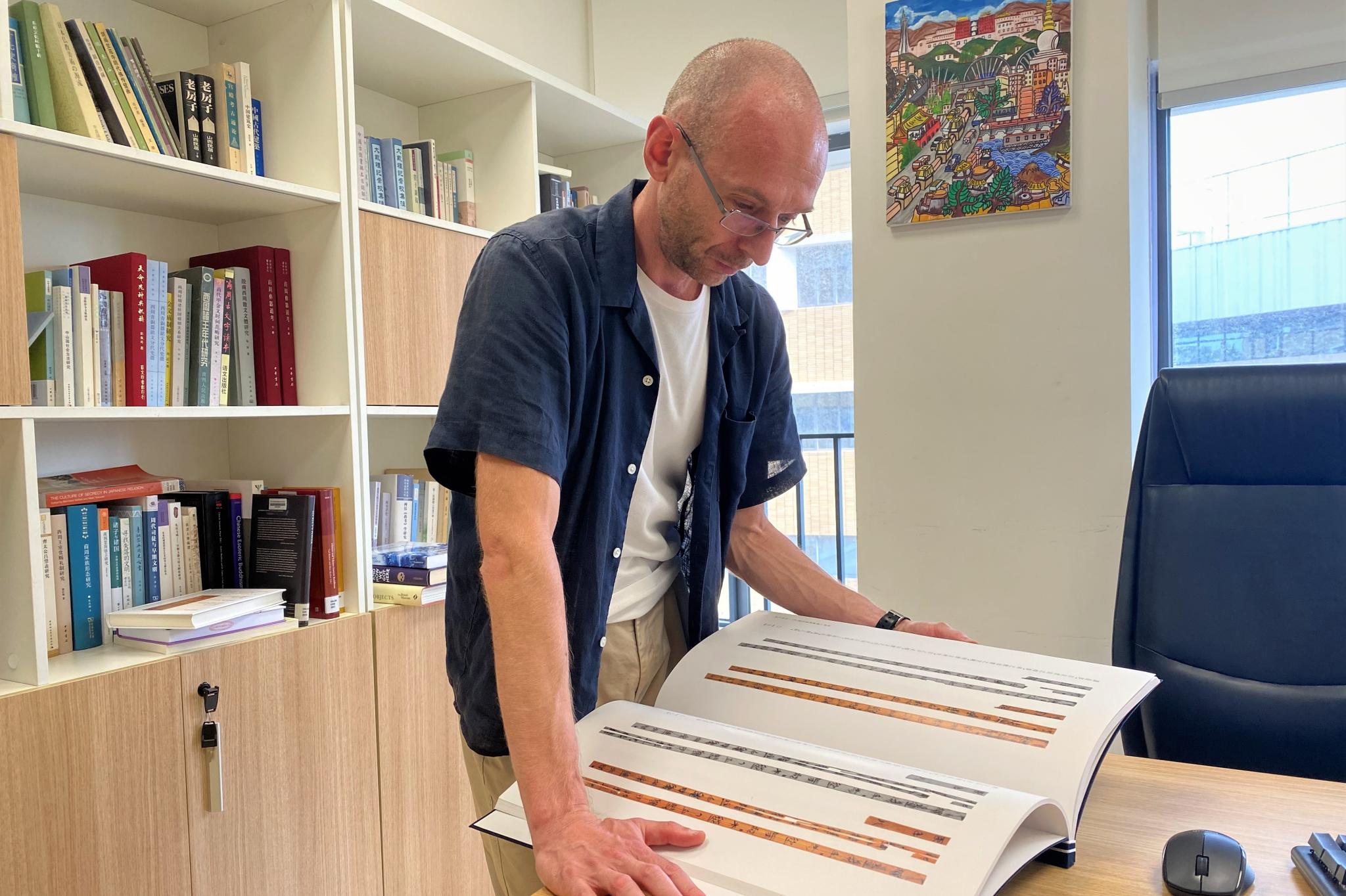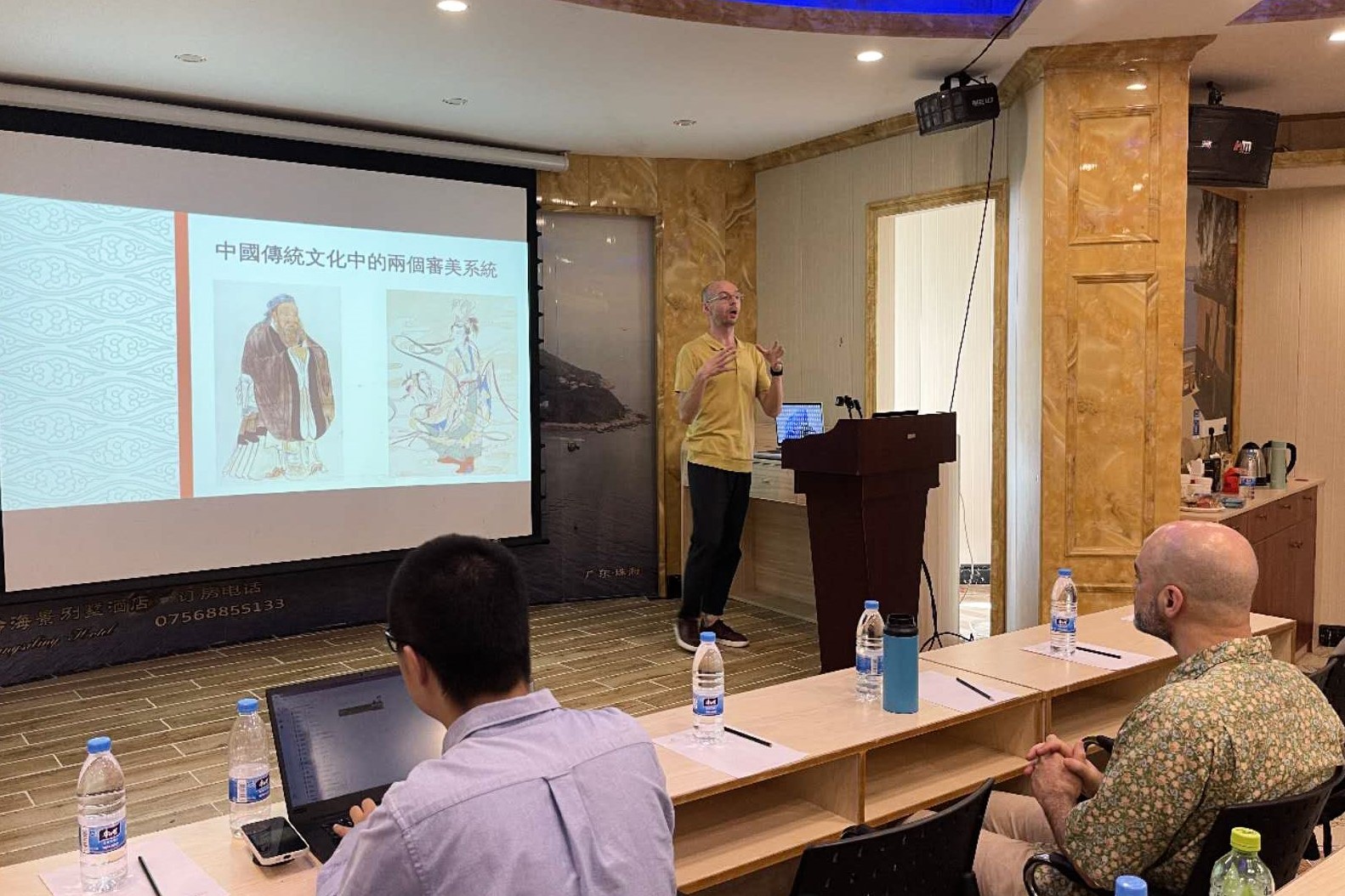近日,《中国日报》(China Daily)发表对best365网页版登录(UIC)中华文化与国际传播专业助理教授Yegor Grebnev(葛觉智)的英文专题报道Ukrainian scholar promotes Chinese history,讲述葛觉智博士对中国古代史和中华文化研究的心路历程及在UIC的教学心得。
为开阔研究视野,葛博士学习掌握了中、法、日、德、乌、俄、英七国语言,并熟读《逸周书》《左传》和《郭店楚墓竹简》等大量名篇名著。在他看来,用外语来展示中国古代文明意味着更大的责任和挑战。报道全文如下:

Professor encourages students to become 'ambassadors' of culture
Yegor Grebnev has enjoyed learning about Chinese culture and history.
Grebnev, an assistant professor at the Beijing Normal University-Hong Kong Baptist University United International College in Zhuhai, Guangdong province, can now interpret works from before the Qin Dynasty (221-206 BC) and translate classical Chinese into seven languages. A historian and Sinologist, he obtained a doctorate in Oriental studies from Oxford University.
The Ukrainian scholar said Chinese civilization is an endless treasure that never ceases to offer academia new findings, and foreign scholars have a unique advantage in studying it. "As foreigners, we are curious about everything about China, which prompts us to constantly ask questions, think, and find new research directions," he said.
Grebnev, who has studied Chinese culture and history for nearly 20 years, speaks fluent Chinese and is proficient in classical Chinese.
"Half of my life has been tied to China," he said.
Grebnev now teaches a Chinese culture and global communication course at UIC, and he has published multiple papers and given many lectures on ancient Chinese history.
Furthermore, he has established a method that enables him to use artificial intelligence to study the ancient Chinese classic Zuo Zhuan, or The Commentary of Zuo, a book analyzing chronicles of the Spring and Autumn Period (770-476 BC) written by historian Zuo Qiuming in the 4th century.

Yegor Grebnev reads a collection of bamboo slips in his office at the Beijing Normal University-Hong Kong Baptist University United International College in Zhuhai, Guangdong province.
With this method, Grebnev uses AI to distinguish content and categorize dynasties based on the different writing features presented in Zuo Zhuan, which is the oldest Chinese historical chronicle in existence.
In addition, he is familiar with classic ancient Chinese books and texts, including Yizhoushu, a compilation of ancient historical documents, and the Bamboo Slips of Guodian Chu Tombs, a collection of slips of bamboo containing ancient texts. Yizhoushu in particular is a classical literary work from the pre-Qin Dynasty era that is not only valuable from a historical and sociological perspective, but is also of great linguistic significance, according to Grebnev.
Due to his fruitful discoveries in his research of ancient literature, Grebnev was invited to join a team that is in the process of translating the Bamboo Slips of Tsinghua. He is responsible for identifying the Chinese characters on the slips and translating them into English.
The Bamboo Slips of Tsinghua is a collection of slips from the Warring States Period (475-221 BC) collected by the prestigious Tsinghua University. The collection showcases the original appearance of pre-Qin texts in various aspects and is considered a major Chinese archaeological discovery.
To study the Bamboo Slips of Tsinghua, Grebnev spent a lot of time and energy interpreting the ancient texts on the slips and regularly met with team members to proofread each other's work to ensure the quality of the translations. "For me, showcasing ancient Chinese civilization in a foreign language means a greater responsibility and challenge," he said.
When studying ancient Chinese history, Grebnev tends to use comparative research methods. He thinks boundaries of historical research should not be limited to a race or country, but should start from the overall perspective of human development.
He regards historians as observers, recorders and disseminators of culture. As more and more cultural relics are excavated, the workload of historians will also increase in the future, he said.
Historians should not only have curiosity, but also perseverance, and they should ensure that they have enough time and energy to solve problems, he added.

Grebnev speaks at a seminar in Zhuhai.
To better understand ancient Chinese research conducted by foreign scholars, Grebnev studied Chinese, French, Japanese and German during his university years. Having also learned Ukrainian, Russian and English at a young age, he is fluent in seven languages.
Grebnev attended Peking University as part of a one-year exchange program during his university years. When he first arrived in Beijing just after the 2008 Summer Olympic Games, the atmosphere was lively, he said, adding that he also visited many other cities in China.
When deciding to come to China for his career development, he chose the Guangdong-Hong Kong-Macao Greater Bay Area. He said the GBA is a convenient area for research cooperation, connecting academia on the mainland, in the Hong Kong Special Administrative Region and overseas.
Before coming to UIC, he spent two years teaching at other universities in China. He said his Chinese students at the time were more shy and less likely to express their opinions, but at UIC, the students are braver, sharing their thoughts more freely and interacting with teachers.
"I think this atmosphere would be more suitable for teachers with international backgrounds like me," he said.
Grebnev very much enjoys his work at UIC, as the college's liberal education integrates China and the West, connecting ancient and modern times. He said he is committed to nurturing students so that they can become "ambassadors" to spread excellent Chinese culture to the world.
Xie Yuchen, a UIC sophomore, said Grebnev is a great teacher.
"He is very knowledgeable … he can use some Western-style research methods to explain the content of our courses in class, including using formal criticism to prove the homology of Confucianism and Taoism, providing a richer research perspective for the dissemination of Chinese culture," she said.
As a foreign teacher proficient in Chinese history and culture, he has many ancient Chinese books in his office, almost all of which are classical Chinese versions, she added.
Zhang Peici, another UIC student, said Grebnev has the ability to simplify topics and make complex points easy to understand.
"He usually guides us to think and judge from the perspective of historical figures, allowing us to learn to understand the historical events being taught from different perspectives," she said.
"Meanwhile, he discovers our personal strengths and encourages us to bravely try, which also stimulates our strong interest in in-depth research on history and culture."
来源 | 中国日报 UIC365best体育官网入口公关处
封面 | 李海珊
编辑 | 罗诗冰 俞诗颖
